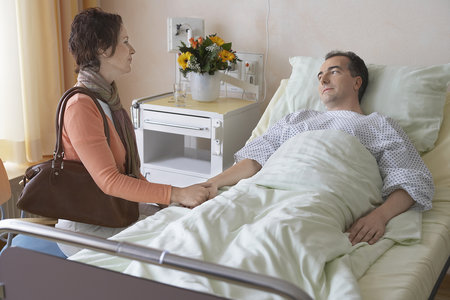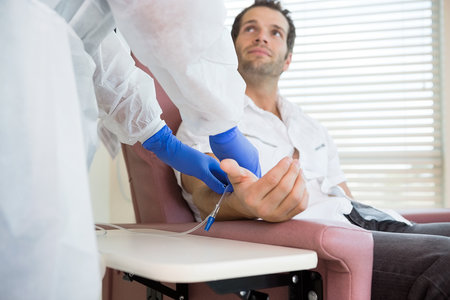Detox, or drug detoxification, is an important first step in the addiction recovery process. To someone who hasn’t had personal experience with addiction, it may be difficult to appreciate how much work has to go into the secession of a substance in spite of deep dependence. Many people struggling with addiction issues try to stop or control their use, but find that going “cold turkey” is so unpleasant that they relapse just to feel normal again. This is because long-term substance abuse affects the brain and the body in ways that it can be difficult to function. A period of time is needed to allow the body to recalibrate itself. With careful attention and rest, the body can start a remarkable process of self-healing that can empower you to begin a life of sobriety.
Two Stages To Detoxing From Drugs:

Long-term drug use can do great harm to the body, and so the goal of detox is to allow for physiological healing. This is accomplished through two different stages.
Stabilization is the first phase, taking care of and treating the most severe withdrawal symptoms, until things have calmed down enough so the person receiving treatment can rest. Within a few hours of taking the last dose of a drug, there are number of issues that can arise that need immediate attention. While it is rare for the early detox process to be life-threatening, it can be extremely uncomfortable. Here are the issues that may arise, with the most urgent issues needing treatment first.
- High stress or anxiety to the point of being in danger to harm self or others.
- Psychosis, visual, auditory, or tactile hallucinations that make it difficult to tell what is “real”
- Physical injuries resulting from high-risk behavior committed while under the influence.
- Medical illnesses
- Depression, to the point of being at risk to harm self.
Detoxification is the second phase, starting after the need for urgent treatment has subsided, and continuing until the withdrawal process is complete. As the body rids itself of the drugs, the focus is on monitoring and supporting the body’s natural healing abilities. In addition, care is provided for the unpleasant withdrawal symptoms. While the symptoms and treatment may be more minor, they are still important to insure a full healing from the effects of substance abuse, so the person receiving treatment can be fully equipped to begin the sobriety process after.
Treating Withdrawal Symptoms:
People’s moods are affected by a variety of different neurotransmitters, or chemical signals in the brain. Drugs work by raising levels of a certain neurotransmitter to levels far beyond what the brain produces naturally. Over time, the brain adapts to these higher levels by producing less of that chemical naturally. The result is that, once you stop taking a drug, your brain has a reduced capacity to receive desired feelings by other means. What this means is that a withdrawal can have effects that are the opposite of being under the influence of that particular substance. For example, withdrawal from alcohol, benzodiazepines, and other sedatives can cause agitation, withdrawal from stimulants like cocaine and methamphetamines can cause fatigue and depression, and withdrawal from opioids like heroin or prescription pain killers can cause body aches and sensitivity to pain.
Generally, common withdrawal symptoms fall into the following categories:
- Mood – depression, anxiety, rapid shifts in emotional state
- Sleep – insomnia in spite of fatigue, or sleeping all the time
- Physical issues – chills, sweating, uncontrolled shaking, nausea, vomiting, diarrhea, and flu like symptoms are common.
- Cravings – the person receiving drug detoxification treatment will likely experience an intense desire for their drug of choice, so the withdrawal symptoms can stop.
The severity and timetable of someone’s withdrawal can vary considerably based on a variety of factors:
- The length of the addiction – a longer period of use will make withdrawal more severe
- The combination of drugs and alcohol used – when different drugs are taken together, or drugs are taken with alcohol, the different substances can interact with and exacerbate each other in potentially unpredictable ways.
- Co-occurring difficulties with mental or physical health – since the withdrawal effects might amplify mood disorders or chronic pain in a way that can be very bothersome.
- A drug’s half-life – Short-acting drugs will be eliminated from the body more quickly, so that the withdrawal process will start and end more quickly.
On average, withdrawal may begin within 24 hours of ceasing use, and may subside within a week.
Drug Detox Methods:
 Home detox – Many people may start at the level of trying to stop use at home, simply taking time off to care for themselves, supervised by a supportive friend, and making use of over-the-counter medication or alternative medicines to treat symptoms as they arise. Generally, this is not recommended, as the situation could easily become too much to handle, except in the most minor cases. You may find drug detox kits and various at-home programs claiming to support detoxification, but these do not offer complete care, and sometimes may even be dangerous themselves.
Home detox – Many people may start at the level of trying to stop use at home, simply taking time off to care for themselves, supervised by a supportive friend, and making use of over-the-counter medication or alternative medicines to treat symptoms as they arise. Generally, this is not recommended, as the situation could easily become too much to handle, except in the most minor cases. You may find drug detox kits and various at-home programs claiming to support detoxification, but these do not offer complete care, and sometimes may even be dangerous themselves.
Outpatient detox – In relatively less severe cases of detox, it may sometimes be good to make use of an outpatient treatment. The patient is able to stay at home and be engaged at work, but makes regular check-ins with a treatment team. These drop-in appointments can look after your physical and psychological well-being, and provide medications that can reduce cravings and treatment. This option can still provide quality care for a patient with a lower level of addiction, issues with money or insurance, or who is unable to leave their home. With drugs that produce strong psychological reactions or feelings of depression, such as stimulants, it may be very tempting for someone to cancel an appointment, or even relapse in between treatments. For this reason, some form of around-the-clock monitoring may be necessary to ensure they stay committed to the detox program.
Inpatient detox – Detoxing at a medical or rehabilitation center is the safest option. In these specialized facilities, trained staff will be constantly monitoring you and have access to resources to help you feel as comfortable as possible. Although rare, there is possibility that withdrawal symptoms can result in serious medical complications or risk of death that will need immediate attention. For these reasons, addiction experts suggest that, in most cases, you should enroll in an inpatient detox program rather than attempt to detox at home. Withdrawal symptoms may begin within a few hours after taking your last drug, so you should check in as soon as possible.
Medications Used In Drug Detox Treatment:
Medicine can be used for a variety of purposes to help assist in the detoxification process. Sometimes medication can relieve the symptoms of physical discomfort, or make the symptoms easier to bear.
At other times, medication can be used as a way to manage dependence and lessen cravings. FDA approved options include buprenorphine and methadone for opioid addiction, and benzodiazepines for alcohol detox. These medications can be used to stabilized someone in severe withdrawal, carefully regulating doses to allow the patient to “taper off” gradually in a safe manner.
With the use of medication in detoxification, there are three approaches that can be taken. One is not necessarily better than the other, but each have advantages and challenges. A responsible detox-team can work with you and your specific condition to determine which approach is best
- “Cold Turkey” Detox – The use of no medication, except in cases of extreme medical emergency. All drugs and substances are discontinued immediately, and medical supervision is light, only helping when it is absolutely necessary. Without any pharmaceutical lessening of symptoms, the patient feel the full blunt of his or her withdrawal, sticking with it for as long as it lasts. This method requires a tremendous amount of discipline, but can allowing the body to heal more effectively, and leave the patient very motivated as they begin to receive more in-depth addiction treatment.
- Short-term Medication Detox – Once again, there is immediate suspension of all substances, including alcohol. However, medications may be used temporarily to alleviate symptoms, making the patient more comfortable and the detox process easier to go through. Medical staff will be standing by more readily available to make the process more comfortable. Medication is used primarily to treat the withdrawal symptoms. Some examples include non-addictive sleep medications, or non-opioid pain relievers. The symptoms can be easier to get through, but certain psychological difficulties such as mood disorders or cravings will be treated in different, non-medical ways. However, for dual diagnosis patients, an antidepressant or antianxiety medication can still become a long-term part of the treatment.
- Long-term Medication Detox– Used primarily for people addicted to opioid painkillers or heroin, long-term medications may be used methadone or Suboxone (a combination of buprenorphine and naloxone) that can lessen the pain of withdrawal considerably. These medications are safe, if taken strictly according to the instructions and supervisions of a medical professional, but can be misused and become addictive themselves. That is why it is vitally important that users of these medications follow the instructions strictly, and are continuously monitored by people in an inpatient rehab facility. Over time, the dosage levels are decreased, and the patient is truly drug-free and sober, and ready to begin addiction therapy.
Finding the Right Drug Detox Program
A good drug detox program should have a variety of resources available, and committed to an holistic approach. By meeting both your medical and psychological needs, using all the possible resources available to make you as comfortable as possible, the staff can make a huge difference in the success of a detox experience. A low staff-to-client ratio, and a large number of staff committed to both professionalism and compassionate care are all important elements in ensuring you will be well taken care of during this difficult but important process of healing.

After Detoxing Drugs
Detox, on its own, can be almost worse than no treatment at all. Any responsible rehab center will be very clear that detoxification, in and of itself, can only provide short-term benefits. It is not the end, but rather, the beginning of a lifelong treatment of dealing with your addiction issues. In fact, one of the main purposes of detoxing from drugs or alcohol is to equip you for the hard process ahead. In further treatment you will engage in therapy, group support sessions, and other activities designed to test your limits, examine the real causes behind your addiction, and learn how to develop better means of coping with the challenges of life. To do this, it is generally recommended that a person coming out of detox immediately begin treatment in an inpatient drug or alcohol rehab center. However, it can also be valuable, for people with lower levels of addiction, to receive support from outpatient facilities or group support meetings. From there, the decision to remain free from substance abuse and compulsions must be a day-to-day decision, of deciding to live your best life possible, and fill it up with activities that advance your health and give your life a sense of purpose. With a lot of hard work, a person who has gone through drug detox and rehab can look back on the other side and have a very free and fulfilling life of sobriety and recovery. However, this isn’t something that is going to come instantly.
It is important to keep in mind that the not everyone will be able to successfully complete drug detox on the first time. Addiction is a chronic and relapsing disease. If you have tried to complete drug detox treatment before, but have “fallen off the wagon” or relapsed, it can very tempting to give up in despair. However, there is always reason for hope, and a reason to keep trying. If you don’t give up, there is always a possibility for lasting change.
http://americanaddictioncenters.org/withdrawal-timelines-treatments/